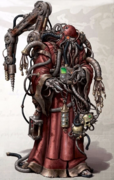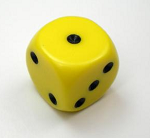|
Olesh posted:What I'm saying is that more people should use the surprise round liberally instead of debating edge cases, and accept that sometimes characters get an advantage out of it. Thanks for this. I agree that interpreting combat more liberally fixes weird edge cases like this. I did more reading on other forums, etc and this question comes up fairly frequently, and the answer that clicked with me the best was "roll initiative any time the order of actions matters." Which isn't strictly RAW but I think matches the intention the best. Reveilled posted:My group rolls initiative (which Iíd consider ďcombatĒ to be synonymous with) any time someone in a scene takes an action someone else might reasonably wish to prevent. Which is also what Reveilled is saying here. sebmojo posted:i mean sure it's a technical rules question but if i was that player i'd be like why is the submicron law ruler being applied to my situationally useful talent the one time it's actually useful, rather than the guy who can snap his fingers and summon 3 black dragons You're right. I was in the wrong, I told the player that, and it all worked out well. We narratively described it as "the last time I'll ever be surprised," and it became a cool moment. This session the PC showed off the scar and growled about how he killed the last guy to ever surprise him, and he'll never be surprised again.
|
|
|
|

|
| # ? May 9, 2024 21:25 |
|
Badass. I do get the appeal of this kind of rabbinical rule parsing in games that are built for it, I just think this example is a bad time for it, good call imo.
|
|
|
|
I'm playing out an exercise in learning how to manage/note take a campaign, basically taking Curse of Stradh and re-writing it in short form notes (seriously why in the world are all the modern D&D, including third party and Pathfinder, adventures so wordy?). Figured I could double it up as eventual material if I ever wanted to try and run it under a different system so not entirely just a learning effort. Going through the book and cutting it down is fairly simple but I've just bene using a combination of Google Spreadsheets and Docs, which has generally been okay but I imagine there is a better way of doing this and there are a few problems I've ran info that I can imagine a better solution exists. The two main things I'm looking for: 1) Since this is a D&D module with everything mapped out, I kind of want to just take a map and annotate it with some pins that I can edit the notes for. I know a couple ways I can do that using office products certainly not suited for that but I feel like there has to be an easy option for this in the RPG sphere. Or as an alternative a tool for keying in something and having an output that can be printed afterwards. Not directly listing everything on the map/image, just keying the image with note numbers and then additional pages with the note details in a standard key entry format. 2) Something I can use for note taking that can quickly link things together. I know I could do something with OneNote which I use at work, but don't have at home. I've seen the the Notion.so tool used by the Lazy GM author, which is probably what I'll try out unless someone here can recommend an alternative. Mostly looking to either simplify re-using ideas/characters/notable objects/traps/so on or creating on-going notes for something I might use more than once, like say notes on running a Vaesen monster so I could have one entry for a monster and just link back to that whenever I want to use it instead of filling in everything in an individual adventures notes or copying them forward.
|
|
|
|
nessin posted:I'm playing out an exercise in learning how to manage/note take a campaign, basically taking Curse of Stradh and re-writing it in short form notes (seriously why in the world are all the modern D&D, including third party and Pathfinder, adventures so wordy?). Figured I could double it up as eventual material if I ever wanted to try and run it under a different system so not entirely just a learning effort. I use TiddlyWiki with TiddlyMap and the TiddlyDesktop Client. This gives you a free, easily editable wiki where you can throw images on and then use them as maps. Installing would require: 1) Install TiddlyDesktop Client 2) Run nw.exe, create new wiki from empty TiddlyWiki file from the client, and open the wiki. 3) Drag the 4 plugin links from the TiddlyMap installation page directly onto the wiki you opened. Hit import. Save and restart. Creating maps is done by: 1) Dragging or copy pasting the image file you want to make a map of onto the wiki, import. 2) Select the map tab on the right side menu added when TiddlyMap was installed. 3) Choose Create New View in the map menu 4) Choose Configure View in the map menu, go to the layout tab, and add the name of your saved image file from step 1 (needs to be exact name) 5) Now you have your image pulled up as a map, and you can click "Add Node" to create notes which are each saved as their own wiki page. You can click "Add Edge" if you want to make connections. You can actually do some cool poo poo with this. You can add all your dungeons to an overland map, and then make it so that when you click the dungeon node it opens up the individual dungeon map. It will definitely get you maps with labels. You can open up all the labels on the left side, and then you can hit print page (one of the non-default options under the tools tab, you could make it a default) I grabbed a map from Pathfinder Society season 0 episode 1 Silent Tide just to show how you could make it. This took a couple minutes. My workflow was: 1) Open up my wiki 2) Open up the pdf. Hit win key + shift + S to snip a picture of the provided dungeon map 3) Hit ctrl + V to paste it directly into the wiki as a new import 4) Make a new view as per above with this image as the background 5) Make labels with Add Node. Each label is its own wiki page, and description text can be added. 
|
|
|
|
Running my cool pulp game and I would love more ideas. My goal is flashbacks meets world of the retro-future. Fate Core system (which means I can get a lot of buying for putting the players in peril.) 1935, Adelaide Australia. We are in a kept up-to-date version of the 1925 pan Australian exhibition. This week, the lounge singer is having a release party for her world music album. I plan to have an old rival, the mesmerist, hypnotize her, sending her into a memory that we havenít explored on camera: a deal she made with a devil to rise from hobo to constantly talent. Meanwhile, the security team got themselves turned into monsters somehow (maybe they ate genetically modified animals, or started playing around with serums). Somehow, the flashback curse is passed from character to character. It would be cool if the flashbacks were automatically tied to the area of the park the players are in; I have plenty of ideas for that. Somehow, the players defeat the security forces and confront the mastermind behind it (either a spurned Hawaiian ex or a longtime rival musician, the Jazz angel-Queen of New Orleans.) Iíd like there to be a reason for the players to go around the park and explore certain sections! Here are the expected players : Lord Simon, fake-British gentleman thief and ostensible leaders Giulla Santinella, Italian stuntwoman / struggling Hollywood Actress, prone to jealousy and being a show off. Florence Zee, nightclub singer and girlfriend of Trudy Truman, over her head reporter who relies on observation and contacts. Massive rich girl energy. Currently, Iím thinking: ó the band shell/starting area. Iíve given the characters time and noticed to prepare short speeches about how much they like Florence. Maybe there are some sound exhibits? Bank of tomorrow: futuristic area with a vault Lord Simon would definitely be tempted to rob. Is there something in there? What? Or should it just lead to tunnels that make accessing and the rest of the park easier? The news pavilion: A 50 pound wired camera on a little cart can project images to tele-visions across the entire park. Itís up to the players to make that useful but could be fun for journalist Trudy. The Dreamtime Dome: biased, but a good source of information on whatever demon Florence made a deal with, and whatever magic is maintaining the flashback curse. Some sort of futuristic race tack for the stunt woman? The house of tomorrow: enjoy the all robot wash day! Defend the white picket fence from roving bands of security mutants! Since we have three female characters (two dating), this will definitely play up themes of domesticity. Anything with ďsomehowĒ is ripe for suggested ideas.
|
|
|
|
Golden Bee posted:Running my cool pulp game and I would love more ideas. My goal is flashbacks meets world of the retro-future. The easiest trick to pull is to tie resolving the memory to getting to a specific point in the exhibit; that way you can get them moving through the whole place. Something else that might be neat is that certain features of the encounter only exist inside the illusion - up to your players how anybody who isn't currently affected by it gets to go in, but it's going to be easier for someone who's already had their illusion scene to "get back in".
|
|
|
|
Help me create a magical puzzle to solve to my characters can retrieve a McGuffin. Background: We are using Rolemaster for the game system. The Rolemaster magic system splits magic into three realms: Essence (manipulation of the physical world(, Channeling (talking to gods), and Mentalism (psionics / powers of the mind). Character classes are defined by which realm they tap into,: - some classes, like warriors, not accessing any - some classes are "semi" meaning they have some magic ability to boost their non-magi abilities and picking from one of the three realms - some classes are "pure" spell users accessing only one realm - some classes are "multi" spell users that access spells from two realms (like channeling/essence, or essence mentalism). Every player receives 1,2,3 power points per level based on their stats, and those power points can be spent by casing a spell with power points per spell equal to the spell's level. So a 14th level Witch with 28 power points can cast 2 14th level Channeling or Essence spells per day or 28 first level spells per day or some combination before needing a long rest. There is one class, the Archmage, that can accesses all three realms and the story is that they use the primordial force that existed before it was made more accessible to magic-users by splitting it up and specializing in a realm or two. Canon states that the Archmage is exceedingly rare: one person in twenty can call magic. Of those, one person in twenty is "pure" or "hybrid" and of those, one in a hundred is an Archmage. So one in 40,000 is an Archmage. Of my three players, all three ended up as archmages: One actually playing the Archmage class and two randomly rolling archmage abilities from background tables. So in-game, the odds of three archmages existing in a town of three thousand is staggeringly small. So I decided to make that part of a thing, "Fate has brought together three archmages for a reason" kind of thing. The puzzle: The McGuffin is sealed in a force field. I want a puzzle that requires three archmages working together to solve it and only archmages can solve it. This can be PCs/players being clever (which mine ARE NOT) or some mechanic requiring dice rolls to solve. The shape, appearance, form function of the lock/forcefield can be anything. All the player know about the room and lock/forcefield is that other spell casters have failed and that other archmages working singly have failed. Some thoughts: I had originally thought of it like a door puzzle in Skyrim with a sequence of combinations of the three realms required to unlock it. Like round 1 A spends a power point in essence, B spends a PP in channeling, C spends a PP in essence, then round 2 A spends a PP in channeling, B spends a PP in essence, C spends a PP in mentalism. For some number of rounds. I'd thought of it like a contested dice roll with each player rolling a d3 and those rolls would have to match my rolls. Each success would unlock a "ring" and there would be X numbers of rings to solve. I like the PCs having to spend a PP on the lock because each attempt has a cost, draining resources, but having them have a 1 in 27 chance of getting that round right for multiple rounds gets impossible quickly. I like the draining of resources because this lock exists deep in a bad guy fortress and I want the threat of having to fight their way out, Death Star style, to put pressure on the players to not just blow through all of their PPs. Suggest to me other lock ideas that require three archmages using either the three realms of magic, or using the primordial force, simultaneously while requiring them to spend power points on it.
|
|
|
|
Golden Bee posted:Running my cool pulp game and I would love more ideas. My goal is flashbacks meets world of the retro-future. I found an annoying character from the players past who can explain the flashback curse; each player can only get it once, like chickenpox. Itís also possible they could figure it out with a lore check. For visiting every land, thatís a relic of a security system of the initial park; someone wanted to make sure the janitors cleared every area so they made the last one unaccessible until the previous ones were visited. It also gives them a reason to get into the vault. The janitors would know the combination but they havenít worked here in a decade.
|
|
|
|
Agrikk posted:Help me create a magical puzzle to solve to my characters can retrieve a McGuffin. I'll try again on this one. I think the forcefield ring one is solid, you just need good riddles or clues to cut down on the random chance. This bit of poetry came to mind as something to adapt: (ps. don't look it up) Gold is for the mistress - silver for the maid" - Copper for the craftsman cunning at his trade! " " Good! " said the Baron, sitting in his hall, But Iron - Cold Iron - is master of them all." becomes: Essence for the Sorceress - Channeling for the Saint - Mentalism for the Scoundrel, cunning in their feint "[Alignment]" said the Baron, sitting in his hall, But Iron -Cold Iron - is master of them all Or whatever the appropriate class names would be. This bit of poetry would clear up which statue or carving needs which type of magic for one round. The tricky part is figuring out whether that is round 1, 2, or 3. Do the ancients hold cold iron as the third most important of the magic metals, or second? Maybe the alignment referenced makes the position obvious to any true scholar of the ancients? Or are the only Barons hanging out in halls the ancients would reference Dwarves, guaranteeing that this is the last combo?
|
|
|
|
I'm having trouble with a quest that a book introduced. It's a bit of a whodunit with social aspects uncovering a "cult." The cult are actually officers of an imperial cruiser being controlled by a malign alien intelligence on a desolate planet's surface. The alien being is trying to free itself by having its high-ranking puppets send its own slaves and normal unsuspecting human crew members down to the planet to excavate the dread alien tomb it's located in. The entrance to its tomb was blasted into rubble by the last Imperial ship to encounter this malevolence, which elected the "take off and nuke the site from orbit" solution to the problem. Unfortunately some artifacts were improperly disposed of and long story short this ship is here now and under the command of mind-controlled puppets. Now it has its pawns surreptitiously using their resources to excavate the site, and they're getting close. It plans to eventually draw the whole crew down into its clutches and then have a hideously beweaponed human cruiser at its command. The book makes it sort of implausible that these people wouldn't have been suspected or discovered much earlier. Supposedly nobody has seen the captain in person for a year, and all his orders have been passed down through his lord-leftenant, his coxswain, and the navigator, who are all compromised. Only the rigid hierarchy of a navy ship has prevented the junior officers from figuring out the con, and the officers outside the bridge command hierarchy are very suspicious. Why the ship hasn't responded to long range astropathic communication is unclear; a ship that size should have multiple astropaths and they're simply not mentioned. I guess I could say that they all killed themselves upon arriving in orbit. They do that when they're trying not to get taken over by psychic evil. Then the explorers show up with a rogue trader and the captain's own daughter in tow -- there's no way the conspirators can possibly conceal that the captain is dead at this point. The conspirators can't plausibly say that the captain doesn't want to greet his social equal, our party's rogue trader, and his own daughter who has hitch-hiked out into the cursed rear end of beyond to find him. So I figure the only way for the alien intelligence (which is supposed to be scarily good at mimicking the people it has subverted) to hide the fact that the captain can't come to dinner with his daughter is to fake an attack on the captain using its other pawns on the ship. That way all of the high-ranking pod people have an alibi, since they were attacked along with the explorers. Then the explorers can find the captain's remains in his quarters alongside the subverted officers, who will pretend to be surprised with great skill. But I'm worried at this point I'm setting a bar too high for the players to clear. Giving the culprits a clear alibi, and making the whole thing orchestrated telepathically, is setting the explorers one mighty red herring. There are other NPCs on the ship who suspect the correct group of culprits, but I'm not sure if the players will get the right sense, especially since the alien menace will definitely implicate other normal people if the players ask its puppets. What other clues can I provide to help the players get on the right track and uncover the conspiracy? Arglebargle III fucked around with this message at 07:29 on Dec 17, 2023 |
|
|
|
Maybe everybody on the ship *knows* the captain is dead, but most folks believe the command crew are pretending he's alive to finish up their current contract? Like there's some line of paperwork that requires him to be "alive" until payday. They're just honoring his last wishes by seeing this last job done. Now that his daughter is here, well, she can fulfill the contract in his place. They're all very eager to have her replace him...
|
|
|
|
Has anyone else tried running Girl By Moonlight or any other Blades in the dark game? How does it differ from PBGA? Just from giving it a glance through, it seems like the GM and the players decide on the setting first before beginning the game proper.
|
|
|
|
It has much faster spiraling consequences, and players are assumed to be on the same team in a way not always true PBTA. It also has clear phases, blades has planning, heist, recovery. More here: https://www.reddit.com/r/rpg/s/QeOtMcunaP Golden Bee fucked around with this message at 17:10 on Dec 17, 2023 |
|
|
|
BigRed0427 posted:...Girl By Moonlight...it seems like the GM and the players decide on the setting first before beginning the game proper. Is it giving you angina? If so, I might recommend coming into session zero with a framework to fall back on if your players are not engaging with the design exercise. Or play a game like Microscope as a warmup with them to get creative juices flowing. Golden Bee posted:It has much faster spiraling consequences, and players are assumed to be on the same team in a way not always true PBTA. It also has clear phases, blades has planning, heist, recovery. I also think the mechanics are tighter in FitD games (at least BitD, S&V, Wicked Ones, and BoB -- the only ones I'm familiar with). Some quick examples: PbtA: A given task is governed by one of about 5 attributes, ranging from -1 to +3. Unless you have a playbook advancement that affects the action, the modifier is usually the only thing that determines how well you do the task. BTW, only 1-2 players in a group will usually be any good in a given attribute. (Some playbooks might allow use of an alternate attribute for key tasks, like combat resolution.) FitD: There are between 9-12 skills, called Actions. These govern opposed or risky task resolution of any type. Characters will have between 0-4 dots in each one, depending on their archetype and how they develop their characters. It's relatively easy for everyone to get good in a single given action (e.g., Scrap for Scum & Villainy; everyone knows how to handle a blaster -- or learns quickly). PbtA: To do stuff, roll 2d6 and modify by -1 to +3 to determine how your move went. Results are generally 6-, 7-9, or 10+, which give different tiers of effect. FitD: Roll between 1 and 5 dice, depending on the number of action dots you have and whether you push yourself (for temporary damage) and/or take a Devil's Bargain for extra dice. (0 dots and no bonus dice? Roll 2 and take the lower.) Highest roll determines result: 1-3 bad, 4-5 mixed success, 6 success, 2 6s critical success. Heat (BitD/S&V) is a fully articulated system for tracking how noisy the crew's actions are and the consequences this has. BitD even has a "Here's what happens to your character in prison" mini game! FitD generally has more mechanics, but not grognardly or even crunchly so. I also find that there's less sameness between characters (not just because of the difference between attributes and action ratings, but you also use the number of action ratings to resist consequences -- let's say you have dots in two social Actions [Sway and Command]; to resist any social consequences, roll 2d to determine how the consequences are reduced). Also, there seems to be fewer "Ugh, Jimbo's the only person who can handle the locked door quietly" scenarios. But the more important consideration is the game world/setting. Monster of the Week (PbtA) does exactly what it says on the tin -- play a Buffy or Supernatural spinoff. I obviously prefer FitD to PbtA, but I'll happily use PbtA for MotW because it does what I want so well. Admiralty Flag fucked around with this message at 18:29 on Dec 17, 2023 |
|
|
|
Agrikk posted:I had originally thought of it like a door puzzle in Skyrim with a sequence of combinations of the three realms required to unlock it. Like round 1 A spends a power point in essence, B spends a PP in channeling, C spends a PP in essence, then round 2 A spends a PP in channeling, B spends a PP in essence, C spends a PP in mentalism. For some number of rounds. I'd thought of it like a contested dice roll with each player rolling a d3 and those rolls would have to match my rolls. Each success would unlock a "ring" and there would be X numbers of rings to solve. 
|
|
|
|
habituallyred posted:I'll try again on this one. I think the forcefield ring one is solid, you just need good riddles or clues to cut down on the random chance. This bit of poetry came to mind as something to adapt: (ps. don't look it up) I love this poem approach. I could make it a legends and lore - type roll. Hrmmm. But this is brilliant. Gotta figure out how to incorporate this without the players knowing.
|
|
|
|
Admiralty Flag posted:I also think the mechanics are tighter in FitD games (at least BitD, S&V, Wicked Ones, and BoB -- the only ones I'm familiar with). Some quick examples: It turns into a sort of negotiation that (in my experience) goes against the one thing I really want from a narrative game - snappy pacing. And that's before you get into the smash-cut/record-scratch between narrative play and the downtime mechanics. I like the downtime mechanics in many respects because they give some really flexible structure to PC advancement, but they don't feel organic in the way that highlights do for PbtA games. I really wanted to like FitD games, especially Blades in the Dark (which has a super-evocative setting). I've both run and played that, as well as Scum & Villainy, and in all cases I loved the theme but just found things clunkier than I wanted when the dice hit the table. I understand that this is a purely stylistic opinion, and that compared to more traditional TTRPGs a FitD game will feel positively streamlined. But compared to Apocalypse World, FitD games just did not deliver the play experience I wanted.
|
|
|
|
I feel the same way, that you get a lot more post negotiation.
|
|
|
|
Ilor posted:I think this is a pretty good summary of some of the differences, but it gets to one of the things I actually don't like about FitD games in comparison to PbtA games, which is the disruption of narrative flow. Player: "I want to run down the Nightspeaker so that I can get a good shot." Flag: "That sounds like Scramble, average effect but desperate positioning, because you're going to have to do make some pretty dangerous moves to keep up with this guy -- remember, he's doing all sorts of Way-enhanced tricks to get away and hinder you." Player: *Rolls dice* eta: (Cut out a bunch of stuff). The only PbtA I've run or played is MotW, but it seems to have the same degree of wheedling and negotiation that S&V did. However, I understand MotW has some issues and isn't the most representative PbtA game. Admiralty Flag fucked around with this message at 21:24 on Dec 18, 2023 |
|
|
|
Golden Bee posted:I feel the same way, that you get a lot more post negotiation. yeah, though tbf that's a trade off with not needing planning time, and is in the context of rolls being important. the degree to which it's a problem I'd guess has a lot to do with how the group works together?
|
|
|
|
Admiralty Flag posted:I feel what you're saying about FitD. However, my experience running S&V (the only FitD I've actually played, as opposed to read and reread; I'm queuing up Wicked Ones or BoB in the new year) is a bit different. 90% of rolls went like this: Yeah, negotiation is presented in its entirety in the rules but it's better thought of as a debug procedure. Ideally the action, effect, and position aren't going to be up for too much debate because they all come out of analyzing the state of the game, which everyone should already be agreeing on. It's important to understand how the whole of the debug procedure works, so you don't get lost when you try to use it, but that doesn't mean you should be using it all the time.
|
|
|
|
Sure, but even the decision to push or asking for the Devil's Bargain felt like enough to slow things down in a lot of cases. That said, there is definitely more granularity of result in FitD, which can have its advantages. Like I said, I accept that it's very much a stylistic preference thing.
|
|
|
|
Ilor posted:Sure, but even the decision to push or asking for the Devil's Bargain felt like enough to slow things down in a lot of cases. One thing I cut from my much longer response is though 90% of the checks worked as in my example, 10% required negotiation and/or analysis paralysis (and the decision to push was a big AP drain, especially before the group got its first trauma and saw it wasn't too bad and had an upside). The "problem" is the 10% correlated heavily, as one might expect, with the more critical rolls of the game, when it would be better (all other things being equal) for things to be moving faster. But unless you have a system where there's no stalling/negotiation/etc., I suppose it'll always break down that way. Also, I wasn't trying to invalidate your experience. I agree it's a preference thing. I dislike the low granularity of MotW, for example (thinking about how to be good in combat, you have to either have a good Tough or a playbook move that subs Tough in Kick Some rear end, while FitD has Scrap/Brawl/whatever that you can level without changing the focus of your character) and would gladly switch to a FitD system if there were one with the same breadth of content and playtesting.
|
|
|
|
Ilor posted:Sure, but even the decision to push or asking for the Devil's Bargain felt like enough to slow things down in a lot of cases. I'm about fifteen sessions into a Blades campaign and I've never found that it slows things down because you're not looking things up or having to adjudicate stuff? everything discussed is fairly core to the central interaction, so should be an interesting decision. But yeah, it's something that will vary from group to group,
|
|
|
|
sebmojo posted:I'm about fifteen sessions into a Blades campaign and I've never found that it slows things down because you're not looking things up or having to adjudicate stuff? everything discussed is fairly core to the central interaction, so should be an interesting decision. But yeah, it's something that will vary from group to group,
|
|
|
|
Ah K. Yep that makes sense.
|
|
|
|
Arglebargle III posted:I find myself wanting to play Dark Heresy in the style of Paranoia: nobody is allowed to know the rules, everyone is a secret heretic, and the inquisition gives you unreasonable objectives. I've decided to run a holiday comedy one-shot of Paranoia ported to Dark Heresy set in Hive Tarsus on Scintilla. I'm adapting Stealth Train because it's one of the most highly reviewed Paranoia one-shots on reddit. The players will be bottom-tier Inquisitorial Acolytes sent to guard the Crystal Shroud of St. Drusus, an artifact standing in for the Stealth Train. Like the Stealth Train it is supposed to be invisible to those without special goggles, doesn't actually exist, and is just a MacGuffin designed to lure people to the location. The one-shot ends with various intrigues spiraling out of control into a four-way firefight, leaving the acolytes either dead or holding the bag. What I'm most wondering about is how to adapt the six-pack system for Dark Heresy. One suggestion I got is to have each of the acolytes have a mandatory memory implant, so that when they are replaced after their inevitable martyrdom in the service of the Emperor their replacement gets their memories and personality. Any other pitfalls I should look out for in GMing this abomination?
|
|
|
|
Arglebargle III posted:I've decided to run a holiday comedy one-shot of Paranoia ported to Dark Heresy set in Hive Tarsus on Scintilla. I'm adapting Stealth Train because it's one of the most highly reviewed Paranoia one-shots on reddit. The players will be bottom-tier Inquisitorial Acolytes sent to guard the Crystal Shroud of St. Drusus, an artifact standing in for the Stealth Train. Like the Stealth Train it is supposed to be invisible to those without special goggles, doesn't actually exist, and is just a MacGuffin designed to lure people to the location. The one-shot ends with various intrigues spiraling out of control into a four-way firefight, leaving the acolytes either dead or holding the bag. I mean, you need a solution to the classic Paranoia problem of "this person's last clone was a traitor/mutant/commie/insufficiently zealous and therefore any future clones will be as well." Paranoia solves it with the Computer's assumption that all new clones are clean and a requirement for evidence before a sanctioned kill. I'm sure that's doable for dark heresy, but it's probably worth having a mechanism to make it text rather than subtext.
|
|
|
|
Thanks, I'll tell them the memory device only transfers memories and then they'll gradually discover it transfers whole personalities.
|
|
|
|
I'm starting to theory craft up the core of my new long run campaign. This would be the 3rd and final of the arc. The reoccurring BBEG has time magic. The players are in charge of a kingdom, and are at war with this bad guy. I know all the pitfalls of time travel poo poo in TTRPGS, so let me bounce this idea and tell me if it won't work before I base my entire game on it. I want each player to tell me one thing their characters have done in the past that they are singularly proud of, and one thing that hangs heavily on their soul. A triumph and a tragedy. I will run a session or three(depending), and have a final battle with the big bad. Whether they win or lose the the big bad will exclaim, "You need to be better. We can't save the world with this level of incompetence. So we do it again. And we will continue to do it again until you get it right." And then set time far back to the start of their kingdom building. But this will also set them back to before their triumphs and tragedy. Then I can use those to build out the game on top of the on going story. Allow them to try and recreate their triumphs and give them another shot at their regrets. I want them to know they went back in time, and keep their memories, because I plan to seed those first few sessions with a lot of stuff I can play with later. Like a NPC betrays them at one point, when they go back they will have knowledge of this NPCs betrayal but how do they act on it? Are they destined to betray them or can things be changed? Since time will go back further than the players having actually played I am thinking of a mechanic where they players have the ability to say ," I remember this. There is X in the next room." or something, Maybe a resource or a roll to see how far along the time line things have deviated. I love to give players that kind of narrative control, so that won't be too hard for me to work with. Any ideas or thoughts?
|
|
|
|
Huckabee Sting posted:I'm starting to theory craft up the core of my new long run campaign. This would be the 3rd and final of the arc. The reoccurring BBEG has time magic. The players are in charge of a kingdom, and are at war with this bad guy. I know all the pitfalls of time travel poo poo in TTRPGS, so let me bounce this idea and tell me if it won't work before I base my entire game on it. Is this a new campaign or the 3rd act of an ongoing campaign? Maybe doesn't matter much to your question, but that's a little confusing. I think my only advice would be that this is a pretty complex concept, so you probably want to be transparent with the players as much as possible in advance about what you're thinking of doing. Otherwise I suspect you'll get triumphs and tragedies that maybe don't work well with the premise...and also I'm not sure what kinds of campaigns and games your group has played before so no idea if this will be a curveball for folks who mostly do hack-n-slash stuff, or if a game where stories are driven by internal narrative/drama would be the norm for them...
|
|
|
|
A half-baked mechanic I'm thinking about and maybe want to write up in the new year: I've been reading about West Marches and Hexploration type campaigns and like the idea of campaigns where being in town or staying still is a little bit of a milestone and abnormality. Also I just generally like mechanics to exist- particularly ones that make players talk out a plan with each other and make decisions. It results in my favorite moment when GM'ing- where I take a break and try to figure out what I want to jump ahead to in my notes. So I was thinking of a system where the Group's time in town is limited. In particular, I was thinking the group gets a count-down timer based on some reputation trait they earn over time. Sure they're heroes who've cleaned out goblin nests or taken down a dragon- but they are are also weird mercenaries with bizarre anti-social behaviors in a world where most commoners never leave town. Adventurers wear out their welcomes quickly in this sort of world. Sort of like how I feel Witchers get treated in that game, Witchers. The group earns a couple of Reputation points every time they go out to the wilds. Maybe 3 on average. And each point can be spent on one full turn (a day) in town. While in town players do get to restore all their health, healing surges, spell slots, and so on. But the group also only get to do one action a day- they can refresh supplies at a general store, try to shake out rumors about the local woods, buy/sell/make a unique object, talk with an NPC, etc. In my mind- this inverts an experience I feel I've had a few times running campaigns where I'm telling the players they enter town and they're waiting on me to further give them motivations, and instead makes "we're entering town" a decision the players are making with purpose. I could also imagine an add-on mechanic where a player can opt to save the group 1 reputation point or extend their stay one day by taking a short term penalty on their next trek and roleplaying a scene of something unfortunate happening to them during their stay: getting beaten up at the inn after drinking too much, getting a letter from a family member with bad news, etc.
|
|
|
|
Sounds like BitD Downtime. Is that an influence?
|
|
|
|
Golden Bee posted:Sounds like BitD Downtime. Is that an influence? I haven't read it. It's been recommended to me a few times but I never picked it up, then I caught wind of some BitD discourse this year where someone picked it up on a similar "oh- that mechanic sounds like BitD, check it out" and they found getting around the setting discussion in the game books to be daunting. edit- I should give it a read, but I feel like I have a list of 6 or so books I should get just to expand my horizons Fidel Cuckstro fucked around with this message at 00:38 on Dec 28, 2023 |
|
|
|
Fidel Cuckstro posted:A half-baked mechanic I'm thinking about and maybe want to write up in the new year: You could also do something like the Angry GM's tension/time pool. Essentially he adds a d6 to a glass jar every time the players do something time consuming. When the jar reaches 6 dice, he rolls them and empties the jar. Alternatively, if the players do something reckless, he rolls the dice already in the jar. If one of the d6 roll a 1, a Complication happens, be that an encounter, new obstacle, snag in a plan, etc. It's a simple flexible tool that provides a nudge to players to use their time thoughtfully without forcing a hard limit, and works well in a variety of situations. For dungeons, every time players spend time searching a die gets added, for example. For exploration, every 4 hour watch adds a die, so that the jar gets rolled once per day. Maybe for your town time, you add one die per day, or per action in town. The party can spend time in town, but if they stay too long they start pushing their luck with Complication. The townspeople get restless about their new weird neighbors. Or enemies they've made track them down in town (they can't track them down while they're in the trackless wilderness). Or one of the players drank too much last night and got into trouble.
|
|
|
|
Oh nice! I think somehow I got pointed towards their blog about travel/exploration while reading up on that topic and really liked his way of framing stakes and risk. e- like, I think this is a really good section from that post: quote:Most importantly, though, the Tension Pool mirrors human psychology regarding the awareness of time, risk, and stress. Peopleís awareness of time and risk rises and falls, which leads to all sorts of interesting behavioral patterns including things like risk homeostasis and the gamblerís fallacy. Most people just arenít aware of how the passage of time, tension, stress, and risk alter their behavior so itís almost impossible for a role-player to portray a character under similar conditions. The Tension Pool imposes a rising and falling awareness of time, risk, and stress and tricks the playersí brains into playing characters as theyíd behave under actual stress conditions. Fidel Cuckstro fucked around with this message at 01:07 on Dec 28, 2023 |
|
|
|
Fidel Cuckstro posted:Oh nice! I think somehow I got pointed towards their blog about travel/exploration while reading up on that topic and really liked his way of framing stakes and risk. This is of course just stealing fronts from PbtA games.
|
|
|
|
Also if you do a favour for someone appropriate you might get another town point to spend on specific things, e.g. rescue a merchants son and get a shopping point. And if there are risky things then roll d4 plus remaining town points to avoid trouble. Neat idea!
|
|
|
|
sebmojo posted:Also if you do a favour for someone appropriate you might get another town point to spend on specific things, e.g. rescue a merchants son and get a shopping point. And if there are risky things then roll d4 plus remaining town points to avoid trouble. Neat idea! Oh nice. Both good additions. My hope is that aside from other bonuses, this creates a sort of reinforcing loop for an exploration-focused campaign where the players are eager to get back to a town to rest/be-safe, but there's always something pushing them back out.
|
|
|
|

|
| # ? May 9, 2024 21:25 |
|
Also just saw this and felt like a really neat gimmick for a power-based combat system like 4e https://x.com/SprintingOwl/status/1740134930087383053?s=20
|
|
|






















